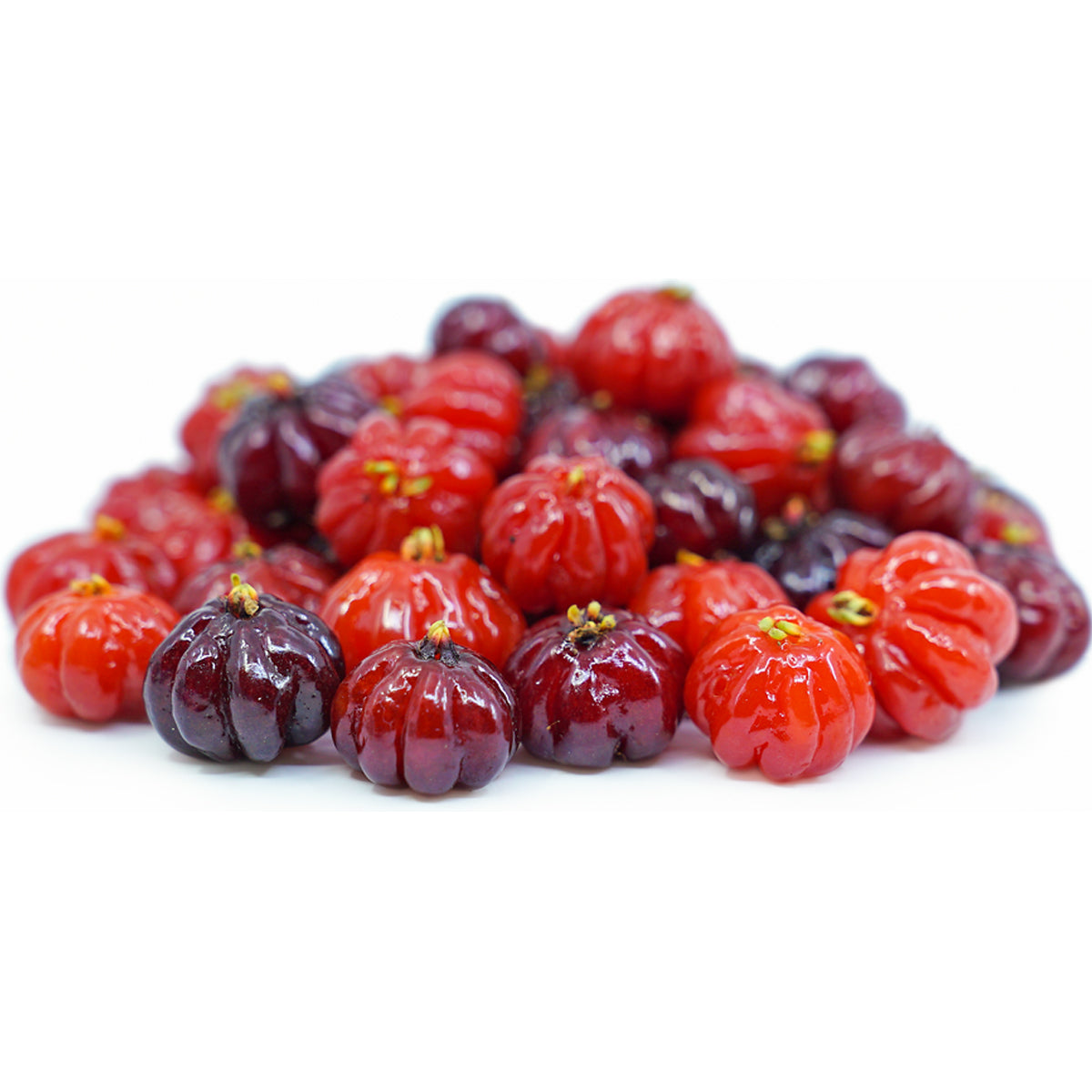Love it? Add to your wishlist
Your favorites, all in one place. Shop quickly and easily with the wishlist feature!
[message]
[title]
[message]

Veliyath Gardens
Couldn't load pickup availability
Bringing together vivid color, tangy-sweet flavor, and impressive medicinal value, the Red Surinam Cherry, or Eugenia uniflora, stands tall as one of the lesser-known but richly rewarding fruits of the tropical world. With its ribbed, pumpkin-shaped berries and bushy evergreen presence, this fruiting plant offers not only a delicious harvest but also a captivating ornamental addition to any garden.
Known widely by different names across continents, the Surinam Cherry has found favor with communities far from its native soil.
Common Names: Surinam Cherry, Pitanga, Brazilian Cherry, Cayenne Cherry
Botanical Name: Eugenia uniflora
In Brazil and Uruguay: Commonly called Pitanga
In the Caribbean: Known as Cereja de Cayenne
In India: Referred to occasionally as Surinam fruit or tropical cherry
Native to South America, especially the rainforests of Brazil, Paraguay, and Suriname, the fruit has now traveled far and wide, earning its place in tropical gardens across Asia, the Pacific Islands, and the Caribbean.
The Red Surinam Cherry tree is a delight to the eyes, offering seasonal beauty in both its foliage and fruit.
Plant Structure: Densely branching shrub or small tree with glossy, aromatic leaves
Fruit Appearance: Deeply ribbed, glossy fruits ranging from green to deep crimson
Size of Fruit: Usually about 2 to 4 cm in diameter
Ripening Process: Fruits turn from green to bright orange, red, and finally, purplish-red
Bloom and Fruiting: Begins flowering in 2.5 to 3 years and fruits by the third or fourth year
With its consistent fruiting once established, this plant brings multiple harvests in a year under optimal conditions.
The flavor of Surinam Cherry is as unique as its appearance—earthy, slightly resinous, and tangy when unripe, turning into a mildly sweet and refreshing taste as it ripens.
Taste Profile: A blend of tartness with a mild cherry-like sweetness and herbal undertones
Aroma: Distinct and mildly spicy, especially from the skin
Best Consumed: When fully red or deep purple, to avoid the bitterness of underripe fruit
This fruit’s flavor palette lends itself beautifully to both sweet and savory culinary applications:
Eaten raw as a refreshing snack
Cooked into jams, chutneys, and fruit sauces
Fermented into wines and cordials
Added to desserts or baked goods for a citrusy twist
Infused into herbal teas and syrups
Its edible skin and soft, juicy pulp make it easy to consume straight from the tree—if birds don’t beat you to it.
A powerhouse in a small package, the Surinam Cherry delivers several essential nutrients that benefit multiple systems in the body.
Vitamin C: Strengthens immunity and supports skin and tissue repair
Vitamin A: Promotes healthy vision, immune function, and organ maintenance
Antioxidants: Help combat oxidative stress and slow cellular aging
Iron: Supports healthy hemoglobin levels and combats fatigue
Calcium and Phosphorus: Contribute to bone and dental health
Fiber: Aids digestion and supports metabolic function
Regular consumption can help detoxify the body, improve skin quality, and aid in resistance against common infections. Traditionally, leaves have also been brewed into teas to treat colds and reduce fever.
In many tropical cultures, Pitanga holds more than just culinary value. It often features in traditional remedies and local customs:
In Brazilian households, Pitanga juice is served as a natural cooling drink
In Caribbean folk medicine, decoctions from the leaves are used to lower blood pressure and soothe digestive troubles
In Sri Lankan gardens, the tree is valued for its resilience and symbolic prosperity
Its appeal spans generations, from children enjoying it as a backyard treat to elders appreciating its healing qualities.
This plant is as friendly to gardeners as it is to fruit lovers. Though moderate in maintenance, it rewards well with care and patience.
Sunlight: Prefers full sun but can adapt to partial shade
Soil: Well-draining, slightly acidic to neutral soil is ideal
Watering: Requires regular watering during dry months, but tolerates short droughts once established
Pruning: Helps shape the plant and increases airflow and fruiting
Pest Resistance: Naturally resistant to most common pests and diseases
Growth Speed: Moderate growth, reaching about 6–12 feet over a few years
It can be grown in-ground or in large containers, making it perfect for home gardens, terraces, or edible landscape designs.
Fruits mature quickly after flowering and should be harvested when fully ripe. To store and savor the fruit for longer:
Refrigeration: Keeps fresh for up to 4–5 days
Jam and Jelly Making: Preserves the flavor for several months
Freezing: Pulp can be frozen and used later in desserts or drinks
Drying: Dehydrated slices can be used in herbal mixes or trail snacks
Because of its quick perishability, home growing is one of the best ways to enjoy its flavor at its peak.
Bringing home a Red Surinam Cherry plant from Veliyath Gardens means adding more than just fruit to your life. It adds value, wellness, and joy.
Offers a rare fruiting experience with a rich, tropical taste
Doubles as an ornamental shrub with vibrant colors
Provides year-round greenery and seasonal harvests
Supports health with powerful nutrients and natural compounds
Adds charm to any garden space without high maintenance
With its vibrant fruits, fragrant foliage, and impressive health benefits, the Red Surinam Cherry (Eugenia uniflora) stands out as a beautiful blend of flavor and function. Whether enjoyed fresh, made into a delicious preserve, or simply grown for its beauty, this plant adds a new dimension to your home garden.
At Veliyath Gardens, we nurture each plant with care so that you can bring home a piece of the tropics that thrives with you. Make room for the Red Surinam Cherry—it’s more than a fruit; it’s a flavorful chapter in your garden’s story.
Sunlight: Prefers full sun but can adapt to partial shade
Soil: Well-draining, slightly acidic to neutral soil is ideal
Watering: Requires regular watering during dry months, but tolerates short droughts once established
Vitamin C: Strengthens immunity and supports skin and tissue repair
Vitamin A: Promotes healthy vision, immune function, and organ maintenance
Antioxidants: Help combat oxidative stress and slow cellular aging
Iron: Supports healthy hemoglobin levels and combats fatigue
Eaten raw as a refreshing snack
Cooked into jams, chutneys, and fruit sauces
Fermented into wines and cordials


